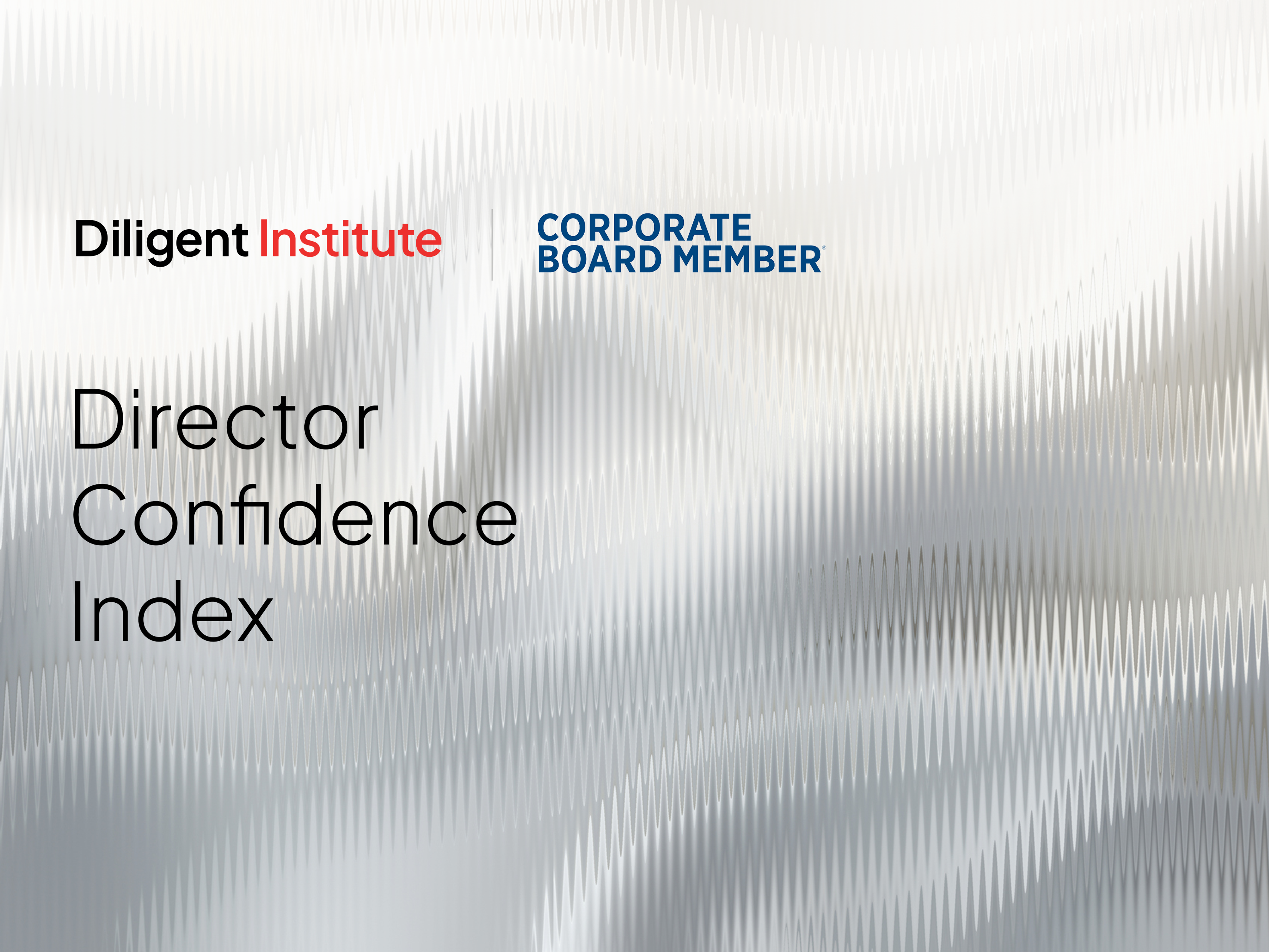Crisis Management at the Board Level: Insights from the NextGen Board Leaders East Coast Summit

How prepared are today’s boards to navigate a crisis? Diligent Institute and Corporate Board Member recently checked in with U.S. public company directors to see how they were feeling about business conditions amid continuing economic uncertainty. The results revealed that directors rate the current risk level businesses face at a 6.8 out of 10 – a clear signal that crisis readiness should be a core governance priority, not a reactionary measure.
Enter the NextGen Board Leaders East Coast Summit, which was recently held at the New York Stock Exchange (NYSE). This program, sponsored by Wilson Sonsini and Meridian Compensation Partners, brings together experts and new public company board members under Chatham House Rule to discuss critical topics in corporate governance, including crisis management in uncertain times. Key insights from this session offer practical strategies for board members to prepare for and respond to various crisis scenarios effectively.
Crisis scenarios are broad – and often simultaneous
Boards should be prepared for a wide range of crisis scenarios, each requiring a tailored approach. These scenarios include significant product failures, unexpected changes in management, scandals or executive misconduct, major litigation, regulatory investigations, cybersecurity incidents, whistleblower complaints, CEO or founder stock pledges and liquidity events, delisting notifications, and acute stock price pressures. Each of these scenarios has unique implications and requires specific strategies.
These events are often interlinked. A visible issue can set off a domino effect – inviting regulatory attention, shaking investor confidence, and prompting customer concerns.
Many of these crisis scenarios are notoriously challenging to handle effectively under pressure. It’s not about predicting every crisis, but about being ready to respond with speed, clarity, and alignment when one arrives.
Crisis response starts with planning, not improvisation
What sets effective boards apart is preparation: whether they’ve built the muscle memory to respond decisively – or are left scrambling under pressure. That’s why it’s crucial for boards and management to prepare in advance, rather than reacting in the moment.
Key components of this preparation include:
- Pre-identified crisis response teams: Establish both internal and external teams that are ready to act when a crisis strikes. These teams should include legal, audit, PR/IR, and bankers to ensure swift decision-making.
- Strong control procedures: Develop clear reporting lines and control procedures to ensure that everyone knows their role and responsibilities when the stakes are high.
- Crisis response plan: Create a detailed crisis response plan or playbook that outlines the steps to be taken in various scenarios. Regularly update and review this plan to keep it relevant.
- Tabletop exercises: Conduct simulations to test the crisis response plan and ensure that all team members are familiar with their roles and the overall process. Identify and address any blind spots.
- Communications strategy: Develop a robust communications strategy for media and social channels. Digital platforms can rapidly amplify reputational risks and trigger concerns from regulators, investors, or customers.
- Preservation of attorney-client privilege: Establish clear protocols to preserve attorney-client privilege, such as involving in-house or outside counsel in all sensitive matters and establishing in advance which communications will include legal advice and how it will be documented.
Steps in crisis response
When a crisis is identified, the following steps should be taken:
- Get the facts: Gather all relevant information to understand the scope and impact of the crisis. This involves a thorough and immediate investigation to ensure that the board and management have a clear picture of what is happening.
- Stop any illegal activity: Address and halt any illegal or unethical behavior immediately to prevent further damage. This step is crucial to mitigate the crisis and protect the company’s integrity.
- Bring in the right players: Engage lawyers, auditors, and a public relations or investor relations firm to manage the crisis effectively. These experts can provide the necessary legal, financial, and communication support to navigate the situation.
- Ensure credible public communications: Ensure that all communications are credible and balanced, while also recognizing the need for complete information. Consider self-reporting and the timing of disclosures to regulators, especially in light of legal obligations under Regulation FD and Form 8-K. Board members who receive direct inquiries from shareholders, the media, or other third parties should avoid providing substantive responses and instead direct all such communications to the General Counsel to maintain consistency and legal compliance.
Risk management requires more than oversight – it demands foresight
Enterprise Risk Management (ERM) plays a central role in crisis management, helping to identify and mitigate risks across the organization. Management is responsible for embedding ERM in strategy-setting and day-to-day operations, ensuring that risks are proactively identified and addressed. The board’s role is to oversee ERM as part of its fiduciary duties, with specific committees receiving regular updates on risk exposure within their remit.
To effectively manage risks, boards should:
- Ensure regular reports: Receive detailed reports on mission-critical risks to maintain a clear, up-to-date understanding of potential threats.
- Document discussions: Capture key discussions, deliberations, and decisions in board minutes to demonstrate due diligence.
- Ask sharp questions: Probe risk mitigation strategies with detailed, forward-looking questions to test assumptions and ensure thorough preparation.
- Clarify accountability: Ensure committee charters clearly allocate risk oversight responsibilities – avoiding duplication or gaps across the board.
Crisis management is both a governance test and a leadership moment. Proactive and strategic crisis management is essential – not just for protecting a company’s reputation, but to preserve its long-term stability and value. By preparing in advance, knowing the critical moves when crisis strikes, and embedding ERM into governance practices, board members can navigate challenging situations with confidence, agility, and sound judgment when it matters most.

Director Confidence Index: Navigating risk & uncertainty
As tariffs, inflation and sourcing disruptions grow, our poll finds America’s public-company boardrooms fighting to manage the moment.

Uncertainty and the board: Strategies for turbulent times
In this episode of the Corporate Director Podcast, Brian Kushner, Senior Managing Director at FTI Consulting, explores the complex challenges facing today’s corporate boards.

What keeps GCs up at night?
New study reveals what keeps GCs and their boards of directors up at night—and the potential opportunities in board-GC collaboration.